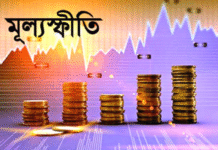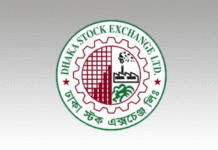
Debt-ridden micro-businesses and informal workers in Bangladesh are staring at new economic distress as incomes evaporated because of the ongoing strict lockdown, which could impose an additional financial burden on them and deepen their plights.
On July 1, the government was forced to reinstate a nationwide curb on movement, closing offices and banning non-essential business activities, as the Delta variant of the coronavirus is sweeping across the country.
Now, the small businesses and informal workers, which have been feeling the heat of the pandemic-induced economic slowdown for the past one and a half years, fear that the restriction, if extended, could leave them without income for a long period and may lead to partial starvation.
“The lockdown will completely wipe out my income ahead of Eid. I don’t know how I will buy the groceries,” said Mohammad Masud, a vendor who sells clothing items from his van in the capital’s Farmgate.
The breadwinner of a six-member family, Masud had to close his business for lockdowns twice: for three and a half months from March to May last year during the first lockdown and for 15 days in April this year during the second one.
He started to borrow since the first lockdown, and now his total debt stands at Tk 2 lakh.
“There is a huge gap between income and expenditure. I forgot the last time I bought a kilogramme of beef for my children.”
This is because his monthly income has plunged to Tk 8,000 from Tk 15,000. But he can only earn when makeshift shops remain open.
“My daughter has been sick for five days and my son for three days. But I couldn’t take them to hospitals as I have no money,” he said.
According to experts, the impact of the economic downfall will last longer for the financially vulnerable sections as many of them were pushed into a debt trap.
In April, the Citizen’s Platform for SDGs, Bangladesh, in a study, found that a large number of households were likely to fall into a debt trap as their savings depleted.
The study, carried out among 1,600 households in February, said 93 per cent of micro, small and medium enterprises (MSMEs) experienced financial hardship due to the pandemic, and their current income was insufficient to cover the current expenditure.
Of the MSMEs, 75 per cent had to borrow to cope with the crisis.
“When earnings opportunity for micro-enterprises becomes unavailable repeatedly, they have no other alternative but to take loans to survive,” said Towfiqul Islam Khan, a senior research fellow of the Centre for Policy Dialogue.
At first they try to borrow from relatives and friends, and then they turn to private lenders, who impose high-interest rates. “Eventually they fall into a debt trap,” Khan said.
Another survey conducted by the Power and Participation Research Centre (PPRC) and the Brac Institute of Governance and Development found households taking loans almost doubled compared to the pre-pandemic level.
The amount of credit per household in the cities stood at Tk 42,961 in March, up 86 per cent from February last year. For a rural household, it was Tk 58,101, up 75 per cent from February.
“The savings of the informal sector workers and micro-entrepreneurs depleted, and their debt in comparison to incomes soared because of the economic downturn. If the income of households decreases, their debt must keep going up,” said PPRC Executive Chairman Hossain Zillur Rahman.
These people constitute the new poor, and although the government has expanded the social safety net by increasing the old-age allowance, the new poor has remained excluded, he said.
Mohammad Babul, a micro-entrepreneur who sells plastic goods in two small shops in the capital’s Adabar and Darussalam, said his debt swelled to Tk 5 lakh in the last one and a half years.
Of the amount, Tk 3 lakh came from a bank and Tk 2 lakh from a private moneylender.
He borrowed the money as he had expected the business to make a turnaround as the economy reopened largely in June last year.
“As the pandemic situation is worsening, and one after another restriction is being put in place, I am not sure whether I would be able to repay the loans.”
He will have to pay Tk 30,000 yearly for every Tk 1 lakh borrowed from the loan shark.
Md Nabinullah, who sells wristwatches in a makeshift shop on Indira Road, said his monthly income declined to Tk 7,000 from Tk 20,000.
As he was unable to bear the family expenses, he took a Tk 1 lakh loan from a microfinance institution. The monthly instalment is Tk 10,500.
“I had thought that the pandemic will be over this year and my business will return to normalcy. But none wants to buy watches now,” he said.
Because of the economic distress, the education of his son and daughter has become uncertain.
“I can’t buy daily essentials regularly. How can I afford the cost of education for my children?” he asked.
Educational institutions have been closed since the pandemic hit Bangladesh in March last year. Although some students attend classes online, most can’t afford it. The schools for primary-level students are not offering any form of education at all.
“I cannot go out begging, but none realises our pain,” Nabinullah said.
Lovely Akther, a tea vendor in Tejkunipara, has not been able to pay her house rent for the last three months.
“What will I get from talking to journalists? Will the government give me anything if you write about me? In the last one and a half years, I have got nothing from anyone,” she said.
Similarly, the daily income of Omar Mia, who repairs rickshaws in Mirpur, has plunged to Tk 200 from Tk 500 before the pandemic.
“I have been suffering from diabetes and heart and kidney diseases for a long time. I need medicines worth Tk 120 every day,” he said.
The 60-year-old could not pay the house rent in the last three months. “The landlord is continuously putting pressure on me. He often verbally abuses me.”
Omar has to look after two granddaughters after the demise of his daughter. He could not ensure nutritious food for them in the last several months.
“I hear so much about government support on the television, but I have received nothing. Now I am eagerly waiting for the Angel of Death to come and take my life.”
In January this year, the government allocated Tk 1,500 crore under a stimulus package for small traders, entrepreneurs and farmers to help them tackle the impacts of the economic fallout.
Eight government and semi-government agencies, including the SME Foundation, the Joyeeta Foundation and the Bangladesh Small and Cottage Industries Corporation, have been given the responsibility to disburse the fund.
Of the amount, Tk 570 crore was allocated in the last fiscal year. The rest is expected to be disbursed this fiscal year.
Officials of five agencies such as the SME Foundation and the Joyeeta Foundation said informally-run micro-businesses and hawkers have been left out of the stimulus package as they do not meet the eligibility criteria, which state that the beneficiaries have to have trade licences and permanent establishments to qualify.
Md Mafizur Rahman, managing director of the SME Foundation, said the state agency channelled funds through banks and non-bank financial institutions.
“Discussions on the need of the informal sector are going on at various forums unofficially. Like other sectors, informal businesses have been severely affected. Thousands of people are engaged in the informal sector. This sector should be given support,” he said.
Of the total employed workforce, about 85 per cent are in the informal sector.
CPD’s Khan called for expanding the social safety net to support the MSMEs.
PPRC’s Rahman said the government should bring the new poor under the safety net programmes and increase the stipend amount for primary school students from Tk 100 to Tk 500 per month.


 For all latest news, follow The Daily Star’s Google News channel.
For all latest news, follow The Daily Star’s Google News channel. 







